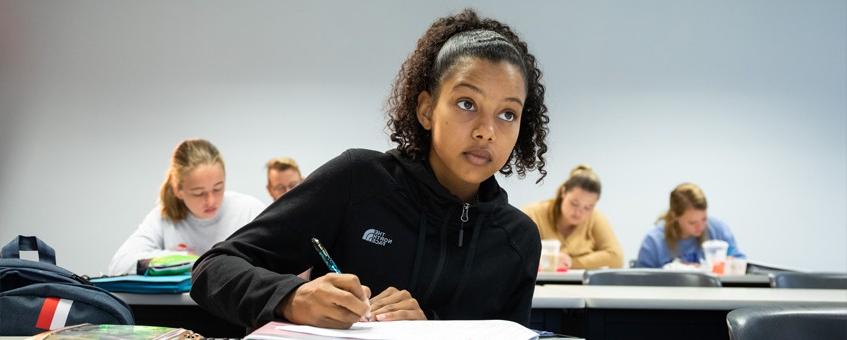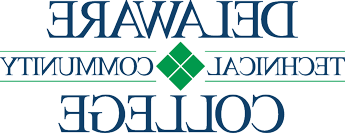
Middle-Level Math Education
Associate Degree
The Middle-Level Math Education Associate of Arts in Teaching Degree Program will prepare students for transfer to a baccalaureate degree program that leads to a teaching career in middle school mathematics. The program will provide rigorous math course work, integrated educational technology, and experiences in a math center and a middle school environment.
Offered at the following campus(es): Georgetown, Wilmington
What You Can Do
- Upon completion of your associate degree, you can work as a paraeducator in the school system.
- Upon completion of your bachelor’s degree, you can work as a middle school mathematics teacher.
What You Will Learn
Program Graduate Competencies
The Program Graduate Competencies listed below identify the major learning goals related to your specific program of study and identify the knowledge and skills you will have when you graduate to be successful in your chosen field.
- Employ mathematical strategies to solve algebraic, geometric, trigonometric, and calculus problems.
- Analyze mathematical principles and theories as they relate to a variety of applications.
- Apply knowledge of the physical, social, emotional, and cognitive development of adolescents in designing and delivering instruction.
- Access and implement educational technology.
Core Curriculum Competencies
The Core Curriculum Competencies listed below identify what you will be able to do as a graduate, regardless of your program of study. You will acquire these core competencies through general education courses and program-specific coursework. You will be expected to use relevant technology to achieve these outcomes:
- Apply clear and effective communication skills.
- Use critical thinking to solve problems.
- Collaborate to achieve a common goal.
- Demonstrate professional and ethical conduct.
- Use information literacy for effective vocational and/or academic research.
- Apply quantitative reasoning and/or scientific inquiry to solve practical problems.
Suggested Pathway to Graduation
Semester 1
| Number | Course Title | Credits |
|---|---|---|
| SSC 100 | First Year Seminar | 1 |
| ENG 101 | Composition I | 3 |
| MAT 183 | Reasoning with Functions I | 5 |
| MAT 162 | Statistical Reasoning | 4 |
| PSY 121 | General Psychology | 3 |
Semester 2
| Number | Course Title | Credits |
|---|---|---|
| ENG 102 | Composition II | 3 |
| MAT 193 | Reasoning with Functions II | 4 |
| MAT 251 | Finite Math | 3 |
| PSY 126 | Child and Adolescent Development | 3 |
| SPA 136 | Spanish Communication I | 4 |
Semester 3
| Number | Course Title | Credits |
|---|---|---|
| SPE 233 | Introduction to Exceptional Learners | 3 |
| ECO 111 | Macroeconomics | 3 |
| MAT 143 | College Geometry | 3 |
| MAT 281 | Calculus I | 4 |
| SCI 150 | Earth and Space Science | 3 |
Semester 4
| Number | Course Title | Credits |
|---|---|---|
| BIO 140 | General Biology | 4 |
| ENG 124 | Oral Communications | 3 |
| MAT 200 | Mathematics Internship | 3 |
| MAT 253 | Discrete Mathematics | 3 |
| MAT 282 | Calculus II | 4 |
To complete program requirements, you must pass the above courses and earn at least 66 credits. The number of courses and credits required for graduation may be more depending on college readiness and the elective courses offered in your program major (if electives are a part of the program).
EDCAATMLM
Pursuing a Bachelor's Degree?
This is a Connected Degree program that enables you to complete your associate degree and then transfer to a four-year degree program as a junior. See a program advisor for details!
Kathy Vezmar
Department Chair, Instructor
kvezmar@poscoop.com
(302) 259-6595
The Delaware Department of Education has granted provisional approval for the Middle-Level Math Education program. However, students must transfer to a senior institution and graduate with a bachelor’s degree in order to be licensed to teach mathematics
This program is offered at the Georgetown and Wilmington campuses.
Alfred Drushler
Department Chair, Instructor
alfred.drushler@poscoop.com
(302) 657-5109
The Delaware Department of Education has granted provisional approval for the Middle-Level Math Education program. However, students must transfer to a senior institution and graduate with a bachelor’s degree in order to be licensed to teach mathematics.

